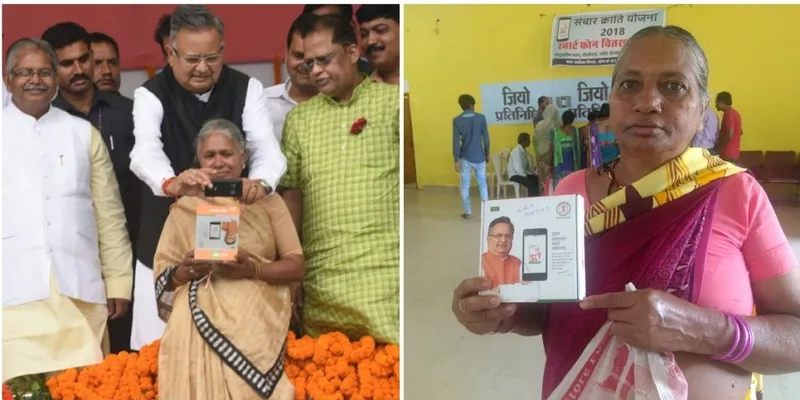How Sanchar Kranti is changing lives of women like Savitri Bai in Chhattisgarh
This article is part of The Chhattisgarh Story series.
For 60-year old Savitri Bai owning her own smartphone has been a major milestone, and one that’s given her immense happiness. Holding her brand new Micromax phone, a beaming Savitri says, “Now I can also take photographs and make video calls.” Her smartphone has empowered her to dream about these small pleasures and actually fulfil them.

She has had a tough life. Within a few years of her marriage, she lost her husband. At the age of 32, this mother of five boys had to shoulder the responsibility of the entire household. She started selling vegetables at various markets in Raipur, and managed to raise her children, educate them and get them married and settled. Today, two of her sons work in garment stores, one is an auto-rickshaw driver and one has a job. Savitri stays with her third son who works in a garment store.
Savitri never owned a phone, and didn’t ask her children to buy her one because she did not want to impose any financial burden on them. If she wanted to speak to someone she would use her either her daughter in law’s regular phone, or her son’s smartphone.
But all that changed earlier this month when the Chhattisgarh government started distributing smartphones to needy women under Phase 1 of the Sanchar Kranti Yojana, and Savitri was among the 45 lakh women across the state who were eligible to get a smartphone. On August 18, she collected her Micromax device from the distribution centre.
The Chhattisgarh government believes that the socio-economic empowerment of women is a key contributor to the progress of the country. In India, the number of working women is lower than the global average. While in China, the women contribute to 42 percent of the GDP, in India it is around 20 percent. Almost 50 percent of the female population in China comprises working women, and in India this number is 26 percent. Experts believe that if the percentage of working women in India comes on par with that of working men, the GDP will grow more than 27 percent.
Of the 50 lakh beneficiaries of the SKY initiative, 45 lakh are women and 5 lakh are students. The state government hopes to bring about greater socio-economic empowerment among these sections by giving them their own phone and enabling them to be more independent and take up jobs. The government also wants women to benefit from schemes likes Jan Dhan Yojana, Ujjwala Yojana, Mudra Yojana etc.
The Chhattisgarh government also plans to set up 1,500 new mobile towers across the state to improve the connectivity and is also giving the SKY beneficiaries 1 GB data and 100 calling minutes free every month for the first 6 months.
For women like Savitri, this initiative gives them a chance to see and experience new things. The enthusiastic grandmother says she will learn how to use the smartphone from her children and is all set to become a ‘smart woman’.







